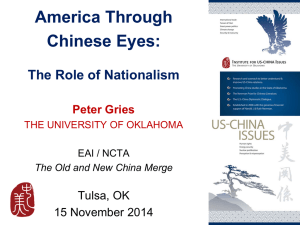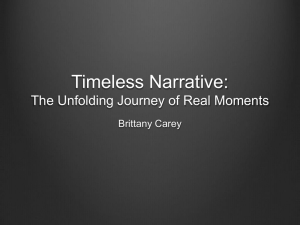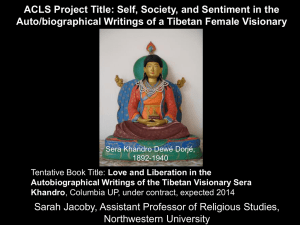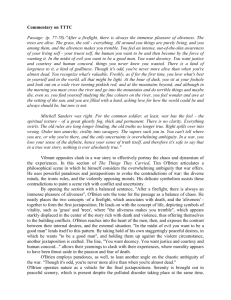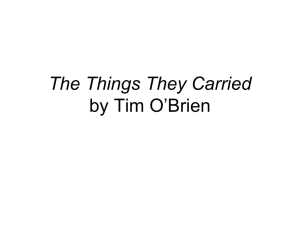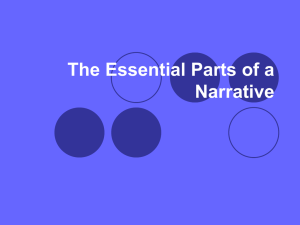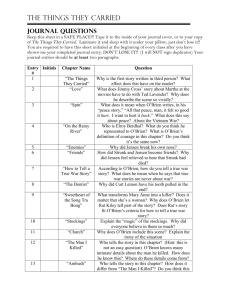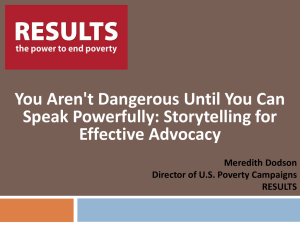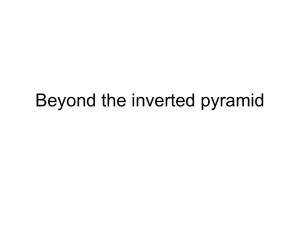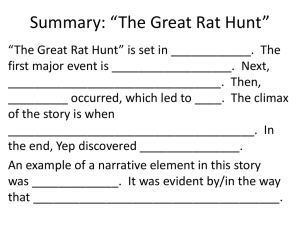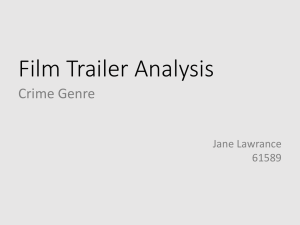POMO
advertisement
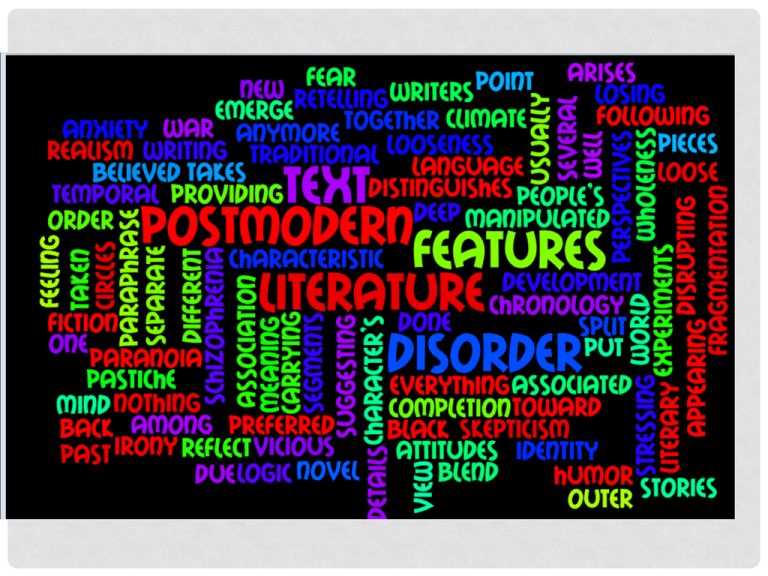
POSTMODERNISM Text AGENDA: OBJECTIVE: • • to understand some of the elements and characteristics of Post Modernism to evaluate how the use of POMO techniques impacts the reader's experience of this text and how they impact the overall effectiveness of the text • • • • • • • • Review and pre-quiz (15) check papers/organization (10) Choose clock partners (5) Read letters (clock partner)(5) Lecture Part 1 (15) Review with clock partner (5) Lecture Part 2 (15) Discuss with clock partner (5) Exit Card (5) POST MODERNISM (AND, NO WE’RE NOT WATCHING PULP FICTION. BUT I CAN BRING IN RAIDERS OF THE LOST ARKS IF YOU WANT. A work by Banksy – a contemporary Post Modern artist POWERPOINT SLIDESHOW THE TITLE GOES HERE TITLE Teacher • Bullet Points • Bullet Points • Question • What is selfreference? • Watch the film clip. • Look for examples of • Irony • Appropriation • Self-Reference Can I teach PostModernism using a Microsoft Product? Is that even allowed? “DOUBLE RAINBOW! OH MY GOD!” - THAT DOUBLE RAINBOW GUY Guy posts hilarious video of himself tripping out over a double rainbow. It goes viral. Somebody takes the video and turns it into a song. That video goes viral It inspires dozens of copies and variations, including, but not limited to - The Dominoes Double Rainbow In Los Angeles recently, an actual double rainbow appears in the sky People in the area begin tweeting about it – many referring to the “double rainbow guy” • Characteristics of Post Modern Literature: WHAT IS POST MODERNISM? According to The Electronic Labyrinth Post Modern literature involves, “the dissolution of distinctions, the merging of subject and object, self and other. This is a sarcastic playful parody of western modernity and the "John Wayne" individual and a radical, anarchist rejection of all attempts to define, reify or re-present the human subject. • Self-reference • Irony • Black Humor • Disruption of archetypal narrative • Some influential POMO Authors: 1. Jorge Luis Borges 2. Thomas Pynchon 3. Kurt Vonnegut 4. Tim O’Brien FROM MUMBO JUMBO BY ISHMAEL REED MEET WITH CLOCK PARTNER TO REVIEW HOW IS TTTC A POMO TEXT? - “It inverts, subverts, the archetypal war narrative…” (Pierce) WITH THANKS TO PROFESSOR PIERCE FOR THE INFORMATION AND ANALYSIS REGARDING TERROR VS. WAR NARRATIVES….. FIRST, WE’LL LOOK AT ANOTHER GENRE TO COMPARE • The Terror narrative • Narrative: a story. • Archetype: original: something that serves as a model or a basis for making copies (Wordnet). • Subvert: to turn upside down or change. TERROR NARRATIVE: SOMETHING UNCIVILIZED, BEASTLY, ENTERS OUR WORLD. THE PROTAGONIST MUST FIGHT IT AND PREVAIL. Uncivilized World • Antagonist: Civilized World • Protagonist: ARCHETYPAL WAR NARRATIVE – “THE WAR STORY IS IN FACT, THE INVERSION OF THE TERROR NARRATIVE” (PIERCE) Uncivilized World • Wartime: • Enters a world of chaos, violence and uncertainty. Civilized World • Soldier: • Leaves world of normalcy and order • As a result, he is transformed, although usually this change imparts him with a sense of nobility and solidified manhood. Typical War Narratives The Odyssey Saving Private Ryan Apocalypse Now All Quiet on the Western Front M.SOCRATIVE.COM • Room Number: 16805 The Things They Carried is a postmodern text because it inverts the terror narrative. True or False? In a war narrative, there is an array of typical motifs 1. the noble example 2. the test of courage 3. the battle as initiation 4. the collective adventure of the platoon 5. the disjunctive return to the civilian world. HOW DOES O'BRIEN INVERT THESE MOTIFS USING SOME OF THESE TECHNIQUES? HOW DOES HE MAKE THE TEXT POSTMODERN? 1. 2. 3. 4. 5. Post-modern techniques Typical features of War • Temporal disorder, disrupting the chronology of the novel, retelling Novels the noble example the past and providing deep details from different perspectives; the test of courage • Pastiche, which arises from the feeling that everything has been the battle as initiation done before, so writers can do nothing but paraphrase; the collective adventure• Fragmentation, suggesting that the wholeness and completion associated with traditional stories is not preferred anymore; of the platoon Looseness of association, carrying the meaning of ‘no logic’. The text the disjunctive return to •is usually put together in a loose order; the civilian world • Schizophrenia, due to which a character’s mind is split into several pieces or segments; • Vicious circles, appearing in fiction when both the text and the outer world blend, so that we cannot separate one from the other; MEET WITH CLOCK PARTNER TO REVIEW SIDE BY SIDE COMPARISON Archetypal or Typical War Narrative 1. 2. 3. 4. the noble example the test of courage the battle as initiation the collective adventure of the platoon 5. the disjunctive return to the civilian world The Postmodern Version M.SOCRATIVE.COM • Room Number: 16805 Which of these is NOT an example of a postmodern technique as present in The Things They Carried? a. Tim O’Brien goes to war and is changed by it. b. Tim O’Brien is a character in his own fictional work c. O’Brien includes elements usually found in non-fiction, such as a letter from a fictional character d. The author addresses the reader directly. . THE THINGS THEY CARRIED • O’Brien blurs the line between truth and fiction purposefully. • He leaves the reader to question, reflect and wonder about what she has read. “In war you lose your sense of the definite, hence your sense of truth itself, and therefore it’s safe to say that in a true war story nothing is ever absolutely true.” Tim O’Brien, The Things They Carried (p 88) "Good movies -- and good novels, too -- do not depend upon 'accurate portrayals.' Accuracy is irrelevant. Is the Mona Lisa an 'accurate' representation of the actual human model for the painting? Who knows? Who cares? It's a great piece of art. It moves us. It makes us wonder, makes us gape; finally, it makes us look inward at ourselves." (Texas Monthly, Nov. 2002. Qtd. ) M.SOCRATIVE.COM • Room Number: 16805 Take the quiz. Try to get your group’s ship across the screen first! Exit Card: 1. What are some of the post-modern elements present in this work by Banksy? 2. How is O’Brien using post-modernism in our text?

